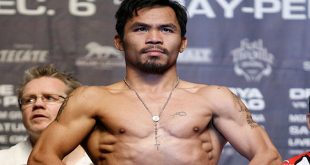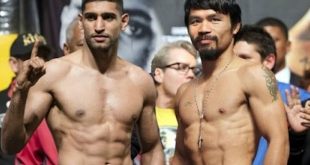 |
What does a world title shot symbolize to a fighter? For most, it is the pot of gold at the end of their respective rainbows, a chance to gain fame, riches, and a new life. Of course, in reality, that is not always the case, but it is a universal pipe dream that fuels young men’s ambitions and hopes. We all need something to |
aspire to, if only to give us a sense of direction and purpose. Boxers spend entire careers laboring in the shadows, (literally) shedding blood, sweat, and perhaps tears along the way in pursuit of their shot, their one chance to reach the pinnacle of their profession and call themselves the best. Win, and you have the world at your feet, lose, and it is a one-way ticket to the back of the queue with nothing but a broken dream. A second opportunity is not always forthcoming; the door can be slammed closed forever. Britain’s newest world champion, Clinton Woods, is well aware of that fact and surely knows how lucky he is.
The Sheffield man was not only fortunate enough to receive a second crack after falling to the great Roy Jones Jr. in his first attempt at world honors, he was given an almost unprecedented third and fourth bite at the apple within a three year time span. Needless to say, it was fourth time lucky for Woods, who seized the vacant IBF light heavyweight title by stopping the hard-hitting American Rico Hoye in five thrilling rounds early last month. No longer Britain’s nearly man, he is now firmly in the mix amongst the likes of Joe Calzaghe, Antonio Tarver and Glen Johnson, all of which offer potential six figure paydays. It is hard not to admire the guys single-minded perseverance; he has had to shake off setback after gut-wrenching setback to be where he is today – near the top of his division with a title belt strapped around his waist. Let’s take a brief look at the bumpy and troublesome road he traveled on the way to realizing his dream.
Woods gave a decent account of himself against a prime (pre-heavyweight) Roy Jones in 2002, before being mercifully halted by his corner in the sixth frame. Despite finding himself utterly bewildered amidst the haze of the then undisputed champions blistering hand-speed and accuracy, he never stopped trudging forward, and walked out of the ring that night with his head held high. The gulf in class between the two was glaringly obvious though; there was only ever one man in it and his name was not Clinton Woods. The pound-for-pound king tattooed him with rapid-fire combinations almost at will, creating the impression that he was in against a below-par opponent; his brilliance made Woods look like a C level fighter, which we know (and he has proved) is simply not true.
Jones had the ability to make even world-class foes appear ordinary – James Toney, Reggie Johnson, John Ruiz – are to name just a few, it is what he did. Afterwards, Woods graciously accepted that he had been beaten by the better man and did not attempt to manufacture any excuses. He lost fair and square, but had performed valiantly enough to garner a certain level of praise from our American counterparts. Probably because, in contrast to Jones’ previous opponent, Glen Kelly, Woods actually went over there to win and did not seem the slightest bit in awe of the incomparable champion. Had he folded like the aforementioned Kelly, without a fight, I am fairly certain that he would not have landed another title shot anywhere near as soon as he subsequently did, if at all. Woods returned home without the belts, but very importantly, his reputation was still intact.
Jones’ rule over the division came to a temporary end when, in order to move up to the heavyweight division to challenge WBA champion John Ruiz, he reluctantly adhered to the sanctioning bodies (WBC, WBA, IBF etc) rules and vacated the numerous 175-pound titles he held, which meant they were up for grabs. Woods was given the opportunity to face Glen Johnson for the IBF crown, only this time he was not such an overwhelming underdog. You see, Johnson was a relatively unknown fighter coming in with nine losses on his record; what was not common knowledge at the time however, is that most of those defeats were either complete robberies or occurred much earlier on in his career. When the bell rang, he attacked Woods hard and often with ferocious intent, immediately letting those who thought he was going to be a pushover know that he was a much better fighter than his resume suggested. After twelve hotly contested rounds, most at ringside were in agreement that Johnson was the clear winner. Woods spent most of the night against the ropes in something of a defensive shell, and in my eyes, at least won no more than four rounds, five at the very best – and I mean the very best.
The draw must have been an incredibly hard pill for Johnson to swallow, but when they met for a rematch three months later, he roared out and more or less dominated the action from bell to bell, leaving virtually no doubt as to whom the winner was this time. Woods had appeared unusually lethargic in both fights; he looked worryingly flat, his movements were slow and ponderous and the naturally smaller Johnson was able to overpower him with visible ease. Serious questions were now being asked. Was he good enough to be successful at the highest level? Was he on the downslide? Would he ever get another chance? It was a bitterly disappointing loss, after which whisperings began to circulate that his best days were perhaps behind him, and some (including myself) even thought that he should call it a day. Woods, not one to make excuses, said that he had not felt right in either clash and seemed genuinely puzzled as to why. While he went away to ponder his future, the overall feeling was that he would never make it to the top.
When Woods made his return to the ring eight months later, it was with claims that he had discovered what was wrong with him in the Johnson fights, (low sugar levels) and a promise that we would see the Clinton Woods of old when he squared off against Jason DeLisle in an a bout for the IBF number two spot. It was a golden opportunity to move towards an amazing fourth crack at securing a world title, for which his promoter, Dennis Hobson, deserves an enormous amount of credit. Was his renewed confidence just a façade though, or had he the really got the spring back in his step? Down briefly in the first, a rejuvenated Woods bounced back and took command of his stocky opponent en route to a twelfth round stoppage victory. It was an impressive showing, one that put him in line to once again fight for the IBF title vacated by his former conqueror, Glen Johnson.
Johnson’s star had soared since his victory over Woods, he went on to knock out Roy Jones in nine rounds and then out-point Antonio Tarver (the top two men of the division) in back-to-back fights. Woods’ decision loss to him now did not seem so bad; he has even stated that the fact that he was able to last the distance with him feeling as weak as he did, actually boosted his confidence heading into his showdown with the undefeated Rico Hoye for the IBF belt. I must confess, I was one of the many who had prematurely written Clinton off, and did not give him much of a chance against the up-and-coming American. When all was said and done though, he had the satisfaction of proving us all (his doubters) wrong, producing a career best performance to stop Hoye in truly scintillating fashion.
Clinton Woods – IBF light heavyweight champion – AT LAST! I couldn’t be happier for him, his dream finally came true.
Next week, I will be taking an early look at the IBF light welterweight clash between champion Kostya Tszyu and challenger Ricky Hatton.
Don Caputo can be reached at don_caputo@hotmail.com
 Boxing News Boxing News
Boxing News Boxing News






